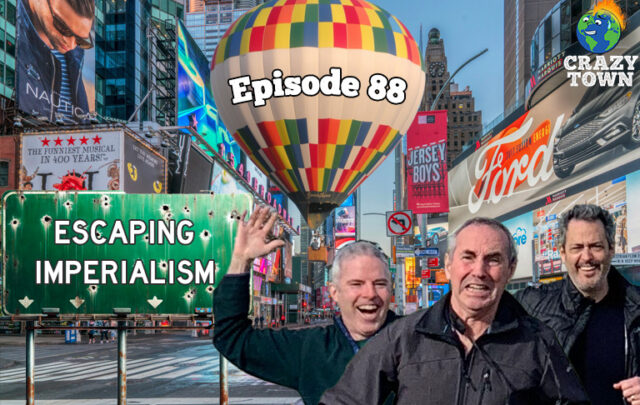According to TerraChoice, an environmental marketing company, the Six Sins of Greenwashing are pervasive in corporate marketing. TerraChoice reviewed the "green" claims of 1,018 products and found that only ONE was true to it’s claim – that is, it did not commit one of the greenwashing sins of No Proof, Vagueness, Irrelevance, Fibbing, Lesser of Two Evils, or Hidden Trade Off. All of the products except for one made claims that were false or misleading.
So I ask you, are you sick of greenwashing? Sick of corporations turning environmentalism into a fashion statement? Tired of advertisements that imply you can consume all you want – because it’s "green"? Disgusted with being told there is one easy answer to pollution, climate change, resource depletion, and species extinction – and that’s to buy one more thing?
I sure as h&*l am! I say, withdraw your support from the corporate greenwashers and don’t buy their crap! Of course, I’m not talking about organic food or toiletries. But if you do need to buy a consumer good, remember that buying USED is the most environmental choice you can make in almost all cases. If you’re preparing for peak oil, you might want to practice buying used goods- they might be all that’s available in a post-peak economy. So here are my top reasons to buy used – used clothes, books, furniture, decorations, electronics, kitchen items, bedding, kid gear, and toys.
- Used products are less expensive. Buying anything used (except antiques) is less expensive than the new alternative, sometimes up to 90% cheaper, but generally at least 50% cheaper. Your dollar will go farther if you buy used, and maybe you will be able to afford buying local organic food or more Peak Oil supplies. So you can (pick one): save twice the money, or buy twice the stuff.
- Used products don’t require new resources. Every manufactured product is responsible for a certain amount of resources consumed – from farming cotton, clearcutting forests, mining for metals, or pumping out oil. The production of new books and furniture require trees to be cut down (95% of books are made from virgin paper). Anything made of plastic is produced from oil pumped from the Earth. The metals in cell phones, jewelry, computers, all must be scraped out of the planet, with horrible environmental consequences. Luckily, there’s an alternative – used items don’t require any new resources to be consumed.
- Used products don’t generate pollution. The growing and producing of stuff pumps a lot of pollution into the environment – including toxic chemicals, pesticides, and carbon emissions. For example, a new cotton T-shirt is responsible for 1/3 pound of pesticides dumped into the cotton fields. A new mid-sized car is responsible for 30,000 pounds of carbon dioxide emitted into the atmosphere.
- Used products don’t require energy to create. The farming, harvesting, manufacturing, and shipping of a new product requires quite a bit of energy from electricity (usually from natural gas or coal) and from oil (from running the vehicles used in farming, harvesting, shipping). This is called "embodied energy". Used goods don’t require any energy, except perhaps the gas required for you to drive over to the guy from Craigslist’s house. The folks at Riot 4 Austerity, who sponsor a 90% energy and consumption reduction challenge, deem used goods to "count" as only 10% of their purchase price, and even better, donated goods from charity stores count as only 0%.
- Used products don’t have packaging. When you buy almost any new product, it comes with some kind of packaging – plastic hard casing, shrink wrap, cardboard box, styrofoam pellets, etc. The packaging materials, along with the actual product, use energy and resources to create. It can be really difficult to find a way to recycle all that packaging, or even more annoying, to have to throw it away. When you buy used from your local thrift shop, Craigslist, or get a hand-me-down from a friend, you don’t have any packaging to deal with.
- Buying used supports good causes and the local economy. Buying from a neighbor keeps your money in the neighborhood, not headed off to Wal-Mart headquarters. Buying from a thrift supports whatever cause they support – literacy, the disabled, the sick, the blind, the poor. Most used stores, even if they are on the Internet, are small mom-and-pop shops, not corporate behemoths. And if you buy it used, you are quite likely keeping it from rotting in a landfill.
- Buying used lets you avoid trying to figure out all the mumbo-jumbo greenwashing claims. Now that green is fashionable, you can buy $290 organic jeans! You can buy organic, fair-trade, natural, recycled everything – for a price. But is it really organic? Who says? By what standard? Is there even a standard? Oh, really, it’s recycled? But what percentage, is that just the package or also the product, is it post-consumer content or just post-industrial, and is it also recyclable? Was it made with sodium laureth sulfate, parabens or pthalates? It’s enough to make you tear your hair out trying to research how to buy every item greenly. Fuggedaboutit – buy used. That way, you definitely won’t be a corporate patsy.
So do I practice what I preach? I looked around my house to see if I do. I came to the conclusion that although I do make an effort to buy used, I definitely have room for improvement. I decided that about 90% of our furniture is used, and about 90% of our clothes, baby toys and baby gear were gifts, hand-me-downs, or thrift purchases. But plenty, plenty of other stuff we bought brand spankin’ new.
I don’t feel bad about buying new appliances if they are more energy efficient, or books if it will help support the author. Still, there are other things that I could have tried a little harder to find used (such as this lamp sitting on my desk). So how could I improve my purchasing habits to buy more used items?
I think the main thing I need to do is plan ahead. If I make lists of things that I will need, and I have time to plan, then I can start checking out Craigslist or Freecycle, ask friends and family if they have any old "X"s they need to get rid of, troll garage sales and thrifts, attend big consignment sales, or ask for a used product for a birthday or Christmas gift. If I need to buy it right away, there’s no time for that – it’s off to the big box store. And then I won’t be able to get any of the benefits of buying used.






